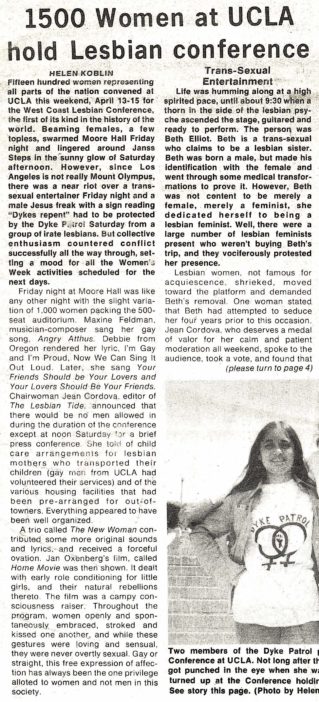Before they formed the Berkeley Women’s Music Collective, Suzanne Shanbaum, Debbie Lempke, and Nancy Vogl separately attended the 1973 West Coast Lesbian Conference at UCLA. There, they witnessed the emergence of a women’s music scene, made valuable connections to other lesbian-identified musicians, and shared their music. As the above article from the LA Free Press recounts, Debbie performed “Gay and Proud” to a highly appreciative audience of 1000, packed into a 500-seat auditorium.
While the Conference itself was beset by controversy (see the full coverage of the conference by clicking on the link to the right, or this post from the “Transgender Berkeley” project), the three members of the BWMC were energized by the event. In excerpts from recent interviews, the three members of the BWMC recall below the conference and its impact.
***
For Suzanne, it was an opportunity to share her music and receive encouragement from the lesbian audience she was trying to reach:
Suzanne: One time, I think right before the music collective started, when I was living up in Berkeley, there was a lesbian conference. And so we went down to this women’s conference, in LA and they had all these women singing who were straight and were singing covers and stuff like that.
And people were like, “Why don’t we have our own music? And so I volunteered to go up there and do one of my songs, and I got up and did one of my songs. And everyone was like, “Yeah! someone from us. That’s really great.” So that was a big thing. And I think Vogl was there too, I don’t know if Lempke was there or not, but anyways, we kind of knew each other from the edges of things.
***
Nancy Vogl and Debbie Lempke recall seeing the Chicago Women’s Liberation Rock Band play at the convention. For them, it was inspiring to see an all-woman band; the experience served as a catalyst for the Collective’s formation.
Nancy: There were women that came from all over the United States to UCLA for the two or three day conference. The Chicago Women’s Liberation Band played and I saw them Saturday night. They took a van, they drove here, and they played the dance. I was blown away because I’d never seen a women’s band.
I did know about Fanny and June Millington, but we didn’t know just a regular hometown band. Kate Millett was at that Conference and said, “Hey, this is great, we should do one.” The following August, she organized the first California, women’s music festival in Sacramento. I think that was August of ’75, and women’s music festivals started springing up all over.
Debbie: I heard about this like national lesbian convention and I was like, I gotta go to this thing. I’ve got to meet everybody by the thousands. It was on the UCLA campus, Vogl was there too. I think that’s where I met Vogl but anyway this is kind of an interesting story.
We get down there and there’s all these people in this big auditorium and they’re about to have an opener. A singer, and I guess it was maybe the head of the Daughters of Bilitus. Well people heard that she was transgender, which was controversial.
Meanwhile, the whole time I’m there, I keep going to the producer and saying, “I gotta get on, I gotta play. I’ve got a song perfect for this place, you’ve gotta let me play.” They don’t know me for a hole in the wall but I just get annoying and somebody says “How many people think we should let so and so perform?”
And half the audience go *cheers* and “how many think we shouldn’t” and the other half go *cheers*. And it’s going to be a riot, so she (the producer) comes up to me and she says “You want to go on?” and I said, “Yeah.”
I went up there and I did “Gay and Proud.”
That was the right song for the right moment. And so that was really great for me because everyone was there pretty much. There was a lot of musicians there so I all of a sudden like people knew who I was and then I just started connecting. I had a journal with me and everybody I’d meet I’d have them write down their name and address in my journal.
And some time during this event there was a thing they had for just musicians and everyone could just go up and do some songs. And so I did that. And I did some songs and I think Vogl did, I’m not sure if Suzanne was there, but did she say she was there?
Lily: Yeah, she said that she was, and she said that she performed.
Debbie: Okay, so then I met her there too, and I hooked up with the Chicago Women’s Liberation Rock Band (CWLRB). I just became friendly with them because I saw them and I was like, “That’s what I want. I want to put a band together.” And they sort of put me under their wing. I had flown down there with a one way ticket and I had hitchhiked or something from the airport.
I don’t know how I got to UCLA and they (CWLRB) let me drive. They were going to take me back up to Portland but they stopped off in Berkeley and I was like, “Oh my God, this is it.”
